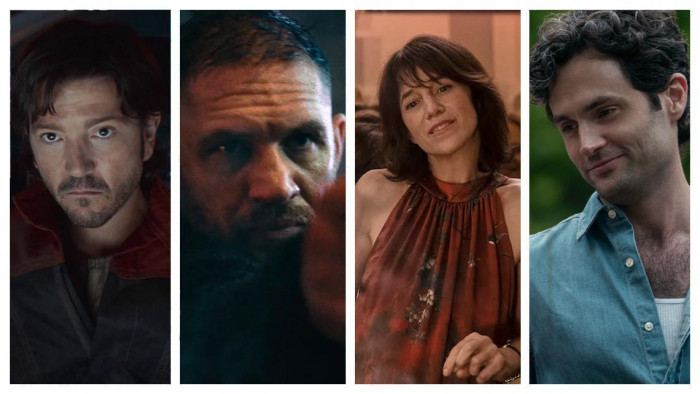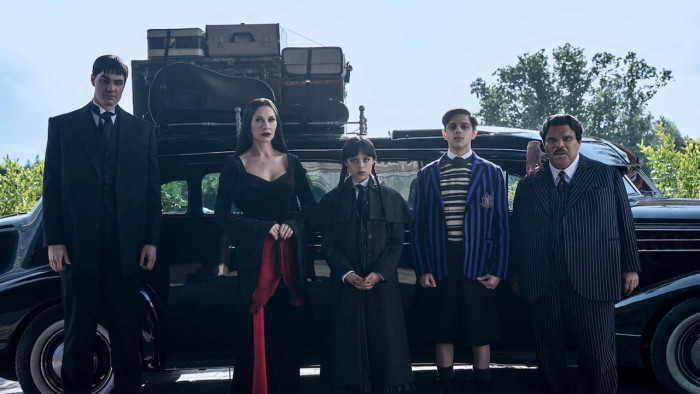Stephen Graham: Who's a pretty boy then?
Stephen Graham has played mob bosses, Victorian killers and psychotic racists. Now he talks beauty


Turning around is an art. Turning around can be done well, like an Olympic ice-skater. Turning around can be done badly, like a drunk uncle on a dancefloor. And, just occasionally, turning around can be done to such effect that the turner ends up facing in the direction of greatness.
Examples of such epoch-defining swivels include: Ernst Blofeld’s chair-spinning, cat-stroking appearance in You Only Live Twice; Johan Cruyff leaving a Swedish defender looking very silly in 1974; and, of course, YouTube’s Dramatic Chipmunk. Now added to this list is Stephen Graham, who has just rotated himself into the 180-degree Hall of Fame.
His turn has revealed what can only be described as ‘quite the look’: his face is an extravagant kaleidoscope of lipstick, eyeliner, blusher and probably other types of make-up undetectable to the common eye. This is an actor who has made a career out of playing hardmen and everymen; whose most famous facial decoration to date, as sometime violent racist Andrew ‘Combo’ Gascoigne in This Is England, was a tiny homemade crucifix tattoo nestled between his eyebrows.
He has never looked prettier than he does right now – and he likes it.
“It’s really good fun!” he says. “When I was first told the concept, I was like, ‘Eh? What you talking about?!’ When I got here, I was sh*tting myself. I’m not going to lie. I had a little word with everyone. I said: ‘Look, me arse has gone. I don’t know what you’re thinking of doing here, but I don’t want to look like a really ugly transvestite.’”
Pausing to appreciate the phrase ‘me arse has gone’, which sounds all the more impressive in Graham’s Liverpudlian accent, I assure him that he looks divine. On his rough, tough 44-year-old features, the colours – reds, purples, pinks and bronzes –give the appearance of a New Romantic lumberjack. If you can’t decide whether you prefer your men rugged or rouged, this is your two-in-one, take-one-bottle-into-the-shower solution. A different kind of Combo.

It’s weird that it’s weird to see a man in make-up. It shouldn’t be; we’ve been painting our faces for centuries. But it is. Like seeing a cat wearing shoes, there’s nothing wrong with it as such, yet it gets your attention.
“I think in the Seventies and Eighties it was more acceptable,” says Graham. “It was a cultural thing, and fashion thing. People making a statement and saying they’re not afraid to stand out and be different, and they don’t give a fuck what people think. I love that. These days, it’s gone a completely different way. It’s more about trying to blend in. There’s a lot of pressure on young people nowadays.
“I didn’t watch it, but that Love Island thing. You see the lads on there, and they’re smashing the gym, and they look great. But the amount of time that must take, checking that everything’s perfect before you go out. Your chest, your back, your arse-crack. We used to just say, ‘See you in 20!’ Then, bosh! T-shirt, shower, bit of Lynx, out. Not today. Today you have to be so fucking perfect. And the thing about that is, they all look the same. There’s no individuality. Everyone looks identical in that world. It’s vanity, but at its core is insecurity.”
You’ll have noticed that this is a special beauty issue of our always-beautiful magazine. It’s taken us more than 10 years to have one. While we often talk about male grooming, we never speak of male beauty. This is perhaps because men rarely call other men beautiful, unless they possess what are traditionally seen as feminine physical characteristics: delicate features, slender frames, pretty eyes, flowing locks or pouting lips. It’s a bummer, really, because who doesn’t love a bit of superficial praise?
No. Men can have a beautiful voice, a beautiful way with words or a beautiful left foot – a proud father might speak of his beautiful boy – but the common idea of physical beauty isn’t reflected in most male faces. Graham, as handsome a chap as he is, is most male faces. It’s why seeing him in make-up raises eyebrows, and not the kind that are drawn on.
It’s also part of his professional appeal: being the best at being ordinary. He works in an industry that shamelessly discriminates on the basis of looks: there’s none like it for judging the size of your skin, colour of your nose or length of your eyeballs. It’s blatant, it’s brutal, and Graham knows all too well that if your face doesn’t fit, well, you might as well stay at home and contemplate your navel.
“It’s fucking horrible,” he says. “My advice to any young actor or actress is to develop skin like a rhino. You can’t take anything personally. Because I’ve walked into a couple of jobs, and straight away they’ve looked up and you know. In your head, you go, ‘Fucking hell.’ ‘OK, sit down. Would you read it, please?’ You’re not even fucking looking at me. The moment I walked in the door, the decision was made.
“I’d never say who they were, but there’s a good few ballbags out there who haven’t really got anything going on apart from their look. You’re smiling, because you’ve probably got the same people in your head! It happens. I’ve heard people go, ‘Yeah, we’ll get him!’ and I’ve said, ‘He’s shit!’ Then they say, ‘But he looks good and he can pull an audience.’ ‘Aw, fucking hell. Really?’”

There’s a polite name for the non-ballbags: character actors. It’s an equivalent of saying someone’s got a ‘nice personality’. “He ain’t pretty,” they say of the character actor, “but boy can he act. Just look at him go, with his asymmetric jaw and interesting eyes, bouncing around above his ill-proportioned, doughy frame. So gifted.” You could take it as damning with faint praise, but Graham, a man who comes across as brimming with positivity, wears it like a badge of honour.
“I only have to look at the amazing character actors that came before me,” he says. “I’ll never be Mr fucking Darcy, and that’s fine. I’d never want to be. But if I’m totally honest with you, I’ve found that most leading men aspire to be character actors. Because that’s what it’s about, isn’t it? Creating a character. That goes for most great actors.
“Leonardo DiCaprio is a character actor. All day long. And the thing about Leo is, he’s a handsome man, but in every role he plays, he tries to make himself look nothing like he really is. Same with Johnny Depp. The ‘uglier’ or the ‘quirkier’ he looks, the better. They’re both great character actors. Tom Hardy, again, a very handsome man, but he doesn’t play on that.”
Graham’s technicolour mask is replaced by white powder, black eye-liner and deep purple lipstick, in a cosmetic exsanguination of Graham’s face; Kiss on dress-down Friday. As the monochrome images flash up on the photographer’s laptop, Graham appears every inch the silent-movie star. He’s acting it, too: sitting the wrong way round on a chair, he poses, pulls faces, pouts, preens, puffs vape clouds from his nostrils like a mime pretending to be a bull, or a bull pretending to be a mime. Is there no end to the man’s flamboyance or verbs beginning with P?
His extravagance brings to mind the peculiar relationship between men and acting, one not dissimilar to that between men and make-up. Despite it producing some of the most noted and powerful male icons of the past 100 years, including many a very macho man, thespianism has long carried an association with being effete. For an insecure schoolboy searching for an easy life, it’s simpler to pull on a football shirt than it is a codpiece and wig – literally easier in the case of the codpiece – and as a result, they are lost to the art.
This later becomes the regret of grown men, who see the actors, the dancers, the gymnasts – those who rode out the mockery of doing ‘girly’ things at school – being cooed over by all sexes, as they have a whale of a time with their confidence, job satisfaction and impeccable physiques. Generation after generation, the lesson is never learned.

One boy who rode it out with pleasure was a young Graham growing up in Merseyside in the Eighties. Now facially cleansed and dressed in the more traditional male uniform of T-shirt, jeans and trainers, he sits next to me on a sofa, leaning at a near perfect 45-degree angle. Swigging on a bottle of full-fat Coca-Cola, he recalls the eloquent opinions of his peers.
“‘What are you doing that gay sh*t for? That poncy acting bollocks?’ ‘Because I like it.’ ‘Fucking dickhead. You a faggot or something?’”
With Graham’s accent, and glassware in hand, it resembles an abominable version of the “Accrington Stanley?” milk ad from the Eighties. “Actors? Who are they? Faggots?” But he wasn’t put off acting – far from it – in part because he was well aware of the off-stage benefits.
“When I was 15, I was appearing in something at the Liverpool Playhouse,” he says. “One of my best mates, Lee, was like, ‘What you doing that gay shit for?’ So I said to him, ‘Come up and see it.’ There was a load of coaches from girls’ schools in, and they all turned up at the stage door. I got about five or six numbers. Next thing I know, Lee comes up, puts his arm around me, and is going, ‘He’s my best mate, he is. Great isn’t he?’ He couldn’t believe it.”
Graham loves his life. Acting isn’t a job for him, he says, and he’s clearly still as keen as a kitten, explaining how his “arse went” when he met Robert De Niro ahead of filming Martin Scorsese’s The Irishman. It’s really hard not to be envious. Before he’s whisked away, I ask Graham what he thinks makes a man beautiful. He doesn’t need long to think about it, and the answer isn’t “nice thighs”.
“I don’t see beauty as an aesthetic,” he says. “It’s someone who’s caring, understanding, puts other people first. Someone who’s not selfish or egotistical, or obnoxious. But there is that fine line. For some people it’s hard to get their head around the fact that the male role model has changed dramatically. Much for the better.
“When I was a kid, my dad was a great role model: doing the dishes, cleaning up. I followed that. Whereas me uncle Eddie can just about wipe his own arse. That’s what him and me auntie Vera have got, and it works, but it can’t happen these days. Today, it has to be a partnership. Thankfully, women’s roles have changed, which is amazing and it’s how it should be.”
As mentioned, Graham gives the impression of being a positive man. He searches, it seems, for good in most people: the kids who called him “faggot”, his feckless uncle Eddie, probably even the ballbags. But it’s still a surprise when he adds Combo to that list: a character whose racially motivated assault on a young black man is one of the darkest acts ever broadcast on British screens. But also one who later, by confessing to a murder he didn’t commit, nobly sacrifices his freedom to spare a friend. Graham views it as a tale of how we can all strive to evolve, to shake off the old ways and embrace something much better.
“I would describe Combo as a man who is beautifully broken. He’s so complex. He’s got a beautiful soul, but he’s been damaged by society and his environment. He was a product of where he came from and how he was treated. He’s always trying to better his ways. He was trying to be a better man. It was great to play that role over 10 years, to see a progression in somebody. There’s a man who really did change.”
And the biggest lesson all men can take from Combo? “He stopped being what he thought everyone wanted a man to be.”
Film Stars Don’t Die In Liverpool is at cinemas nationwide now
Latest
Related Reviews and Shortlists









